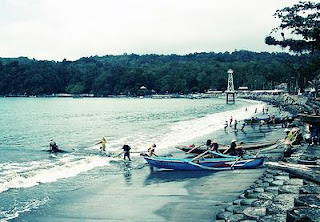 Grand cultural feast of Lake Sentani Festival (FDS) which carries the theme "Loving Culture For Our Future - Love Culture For Our Future" at Kalkote Tourism Region, Eastern Sentani, Jayapura regency, Papua, on 19 to 23 June 2010 is a major gateway for tourism industry 365 days. If in one year there were 365 days so much these days were also the tourism activities take place.
Grand cultural feast of Lake Sentani Festival (FDS) which carries the theme "Loving Culture For Our Future - Love Culture For Our Future" at Kalkote Tourism Region, Eastern Sentani, Jayapura regency, Papua, on 19 to 23 June 2010 is a major gateway for tourism industry 365 days. If in one year there were 365 days so much these days were also the tourism activities take place.It was announced by Head of Jayapura, Abel Melkias Suwae in Jayapura, Sunday (30/05/2010), in connection with preparation for the grand event which is the FDS 2010 annual cultural feast for the third time after a successful course held twice a cultural festival in the year 2008 and 2009. "Actually, FDS itself is the main entrance or starting point of the tourism industry in particular and Papua Jayapura District in general during the 365 days or a full year," said Abel.
It means that tourism activities in order to strengthen its identity as indigenous peoples, to preserve the values and cultural traditions of native Papuans and culture of the archipelago as well as populist economic development not only take place on June 19 to 23 but as long as 365 days or one full year.
"Do not let us think that the tourism industry only lasted for five days only ie June 19 until June 23, 2010 and after that date of tourism activities in the Jayapura regency came to an end until we meet again in June 2011," he said.
These misconceptions must be straightened is that tourism is a continuous non-stop with the passage of days in one year. "If in one year there were 365 days so much these days were also the tourism activities take place," he said.
To that end, Jayapura Regency Government seeks to build and organize tours villages to attract domestic tourists as much as possible (wisnu) and foreign tourists (tourists) to come to tour villages continuously without stopping.
 Tourists come to the tourist village to witness and enjoy the natural panorama of the beautiful land of Papua, to see with my own eyes the various traditions and cultures of local communities. "Who would love and protect the traditions and culture means he prepares menyusulinya future generations," said Abel.
Tourists come to the tourist village to witness and enjoy the natural panorama of the beautiful land of Papua, to see with my own eyes the various traditions and cultures of local communities. "Who would love and protect the traditions and culture means he prepares menyusulinya future generations," said Abel.Abel explains the impact of tourist arrivals is the people of Papua to the outside world become more open, positive interaction, mutual learning, mutual giving and receiving. "More than that, the wheels of the economy of the people in villages would be spinning faster and faster towards achieving the common welfare that aspired to," he said.
When tourists come to the villages, so they will buy the various souvenir or memento to take home a household handicraft industry and so forth. In addition, tourists will also visit the various restaurants or restaurants. There was a culinary tourism.
According to Abel, if the culinary tourism activities went well then the manager of the restaurant itself was going to buy from local people of various kinds of vegetables, fish and shrimp, potatoes and sago, which is the result of people's efforts in agriculture, horticulture and fisheries.
"This is what we mean, with the rotation of tourism industry during the 365 days that begins with a grand cultural feast of Lake Sentani Festival. Thus, the FDS was a major gateway into the tourism industry in the Jayapura District," said Abel.
Meanwhile, Chairman of the Committee of FDS in 2010, Ir Anna Osh Sawai said, the Committee of FDS has been and is doing various preparations so that the FDS in 2010 which is a gate of tourism during the 365 days that could be held on time, smoothly and successfully.
 "The packages we have prepared the FDS performances, exhibitions, investment promotion and tourism packages. For there will be a performance package of attractions and cultural competitions are typical of the Archipelago of Papua and colossal, whether dance, music, songs, folk games, acesories and so forth," he said.
"The packages we have prepared the FDS performances, exhibitions, investment promotion and tourism packages. For there will be a performance package of attractions and cultural competitions are typical of the Archipelago of Papua and colossal, whether dance, music, songs, folk games, acesories and so forth," he said.While the package of promotional exhibitions, investment and trade with display booths from various sub-sectors of the economy and the land of Papua, Jayapura.
Package tours are interesting tour around the lake Sentani and visited tourist villages located on the lip of Lake Sentani to visit the tourist village Tablanusu a very beautiful natural panorama. Jayapura Regency Society is open to tourists, both domestic and foreign.
Jayapura community welcomed the arrival of the tourists for 365 days without stopping. "We love our own traditions and culture and that means we have prepared a future for their children and grandchildren heir to the land of Papua," said Anna.



